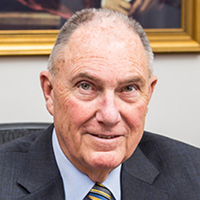The Girardi Effect
By David C. Carr
A State Bar Court hearing judge filed her decision this week recommending the disbament of Thomas V. Girardi.
By David C. Carr
A State Bar Court hearing judge filed her decision this week recommending the disbament of Thomas V. Girardi.

An opportunity suddenly appears: You’re a solo practitioner or in a small firm. You have the chance to join a larger firm — where the prospects appear brighter — or a chance to join another firm that better fits your practice. Before you leap, however, consider the ethical constraints that could haunt you and your future firm.
By Edward McIntyre
Many jurisdictions adopted a version of ABA Model Rule 1.14 to give guidance when lawyers must confront obligations to a client with diminished decision-making capacity. Our Rules Revision Commission submitted a proposed version of rule 1.14 to the Supreme Court that attempted to reconcile the Model Rule’s approach with unique California obligations, including our obligations of confidentiality.[1] The Court did not adopt proposed rule 1.14. The need for guidance, however, about ethical obligations to clients with diminished capacity remains. The State Bar’s Committee on Professional Responsibility and Conduct (COPRAC) stepped forward with a recent formal opinion.[2]
By Charles Berwanger
Lawyers are often put into the position of knowingly (or even unknowingly) receiving client direction to, for example, include in a contract an illegal provision. Too, lawyers are often directed to enforce such an illegal provision.
By Jessica Park and Andrew Servais
The California State Bar recently seized the client files of Efferin Deans, a man with a 25-year history of impersonating attorneys and two prior convictions of identity theft.[1] On Oct. 27, 2021, a criminal complaint was filed in Los Angeles County naming Efferin Deans and twenty-two aliases that Deans utilized to impersonate a lawyer and appear on the record as a licensed attorney for family law and personal injury cases from January 2019 to September 2021 (See People v. Deans, Los Angeles County Superior Court,Case No: BA499952).

One of the most rewarding aspects of an attorney’s job is providing pro bono services to those in need.[1] Though not required, lawyers are encouraged to provide pro bono legal services during their legal careers.[2] Pro bono work is also a great way for new attorneys to gain experience, develop new skills, and handle their own cases from start to finish.
By David C. Carr
Lawyers owe many ethical duties to their clients. Most of these duties are bottomed on the fiduciary nature of the attorney-client relationship. But lawyers also owe ethical duties to the judicial system and other persons arising from their status as officers of the Court and agents of the justice system. The most exciting (sometimes too exciting) problems in legal ethics arise from conflicting duty situations. California’s Rule of Professional Conduct 1.2.1 provides the context for many conflicting duty scenarios. It has been a part of ethical controversies since it became part of the black letter law of legal ethics on its adoption by the Supreme Court in November 2018.
By Edward McIntyre
A Central District of California grand jury issued subpoenas to a company and its lawyers related to a criminal investigation of the company’s owner, also a client of the lawyers. The subpoenas sought documents and communications related to that criminal investigation, the target of which was the company’s owner. The company and the lawyers produced some documents, but withheld others based on assertions of the attorney-client privilege and work-product doctrine. Prosecutors pressed the issue. The district court (Hon. John Kronstadt) determined that the withheld documents were not protected by any privilege or were discoverable under the crime-fraud exception to the attorney-client privilege. The company and the law firm disagreed with the court’s rulings and continued to withhold the disputed documents. The court then held the lawyers and the company in contempt because they failed to comply with grand jury subpoenas.

As judges around the country weigh how to hold accountable the lawyers who abused the courts to advance former President Trump’s frivolous challenges to the 2020 election, two recent cases are particularly instructive for attorneys who wish to comply with their ethical responsibilities. These cases also present a good opportunity to review various State Bar Act provisions and the California Rules of Profession Conduct [CRPC] that are potentially implicated by these recent developments.

By Andrew A. Servais
With the recent release of the “Pandora Papers,” renewed attention is focused on corporate ownership transparency. The so-called Pandora Papers release from the International Consortium of Investigative Journalists (ICIJ) has outlined the elaborate mechanisms that the wealthy deploy to shift funds between global jurisdictions, masking their true wealth and minimizing their tax obligations while also unmasking the U.S. as a tax haven — including the state of South Dakota with its proliferation of “dynasty trusts.”